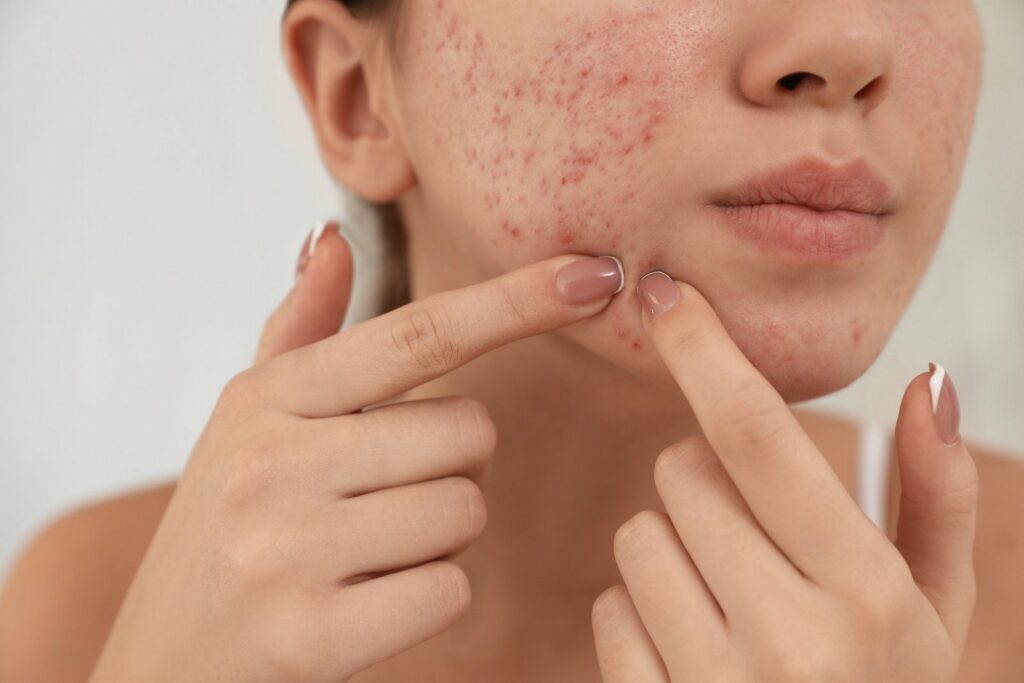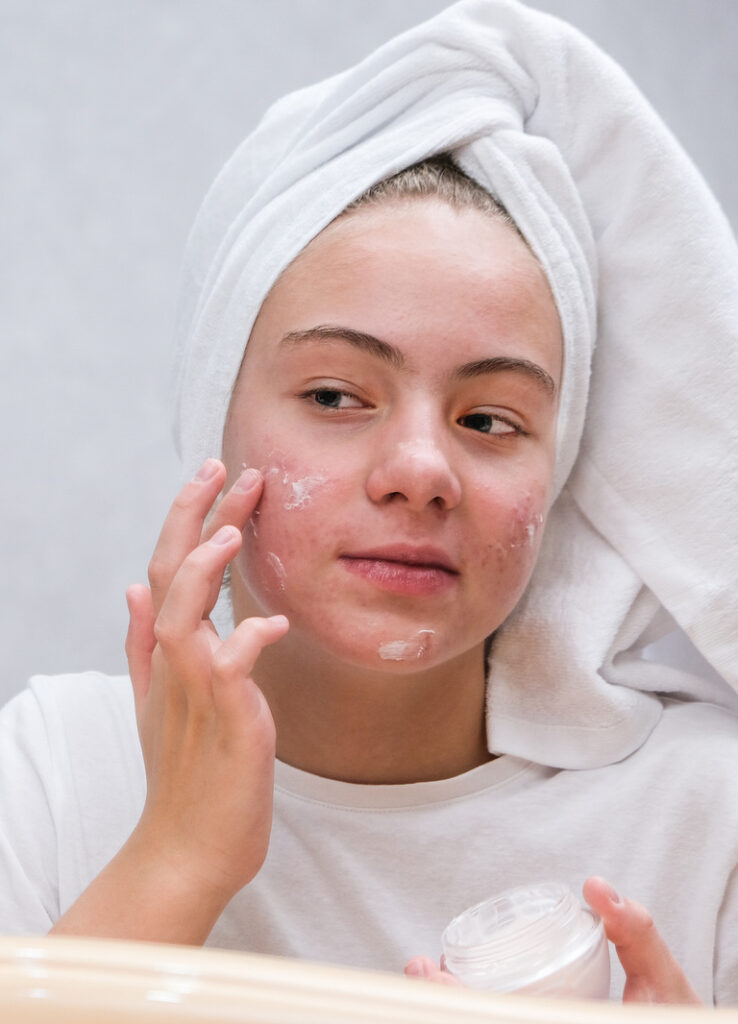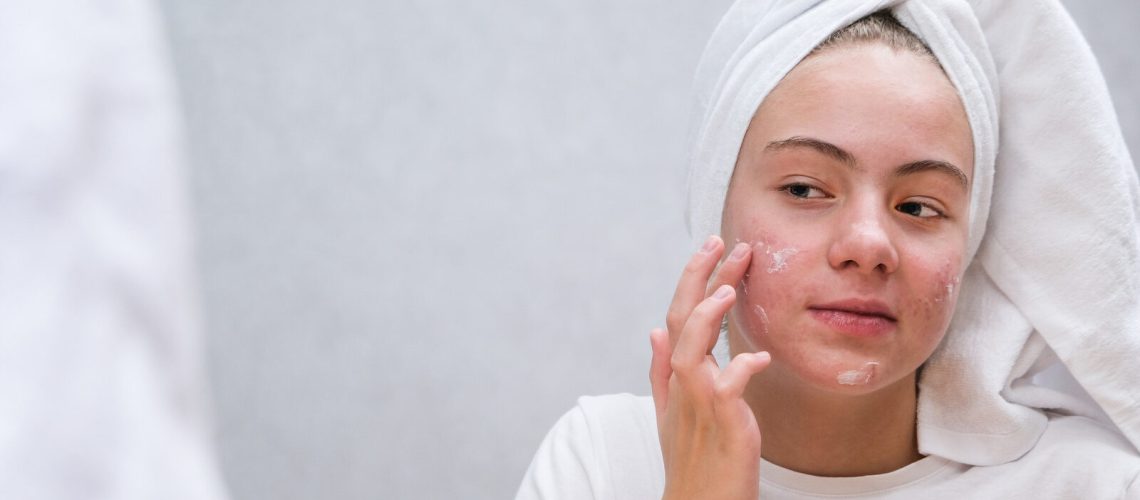If you find that you are asking yourself “Why is my acne getting worse?” despite your efforts to manage it, your skincare habits might be contributing to the issue. Acne is a common skin condition that affects people of all ages, and its severity can vary greatly from one person to another. While there are various treatments available, understanding the potential triggers in your skincare routine is crucial for achieving clearer, healthier skin.
The American Academy of Dermatology has identified several practices that can exacerbate acne and prolong its duration. By recognizing these habits and making adjustments, you can help your skin heal and prevent future breakouts. It’s important to remember that while it can be tempting to try multiple products or routines to find a quick solution, consistency and patience are key when it comes to managing acne effectively.
Moreover, certain factors such as hormones, genetics, diet, and stress can play a significant role in acne development. By being mindful of these potential triggers and taking a holistic approach to skincare, you can create a routine that promotes clear skin and overall well-being. Let’s explore the common habits that might be affecting your skin and how you can adjust them for better results.
Understanding Acne
Acne is a common skin condition that occurs when hair follicles become clogged with oil, dead skin cells, and bacteria. This can lead to various types of blemishes on the skin, such as whiteheads, blackheads, papules, pustules, and cystic acne. By understanding the causes and types of acne, you can tailor your skincare habits to better manage your skin.

Types of Acne
Whiteheads: Also known as closed comedones, whiteheads form when a pore becomes clogged and remains closed, causing a small, white bump on the skin.
Blackheads: Also known as open comedones, blackheads form when a clogged pore remains open, and the contents oxidize, turning the tip of the pore dark.
Papules: Papules are small, raised, red bumps on the skin that do not contain pus. They can be tender to the touch.
Pustules: Pustules are similar to papules but contain pus. They often appear as white or yellowish bumps surrounded by red, inflamed skin.
Cystic Acne: Cystic acne is a severe form of acne characterized by large, painful, and deep lesions beneath the skin’s surface. Cystic acne can lead to scarring if not treated properly.
Causes of Acne
Hormones: Hormonal fluctuations, especially during puberty, pregnancy, or menstrual cycles, can stimulate the production of excess oil (sebum), which can contribute to hormonal acne.
Genetics: A family history of acne may increase the likelihood of developing the condition. Genetic factors can influence the skin’s oil production and sensitivity to inflammation.
Diet: While the link between diet and acne is not fully understood, some research suggests that high-glycemic foods (sugary and processed foods) and dairy products may contribute to acne in certain individuals.
Stress: Stress can trigger hormonal changes that may lead to an increase in oil production and inflammation, potentially worsening acne.
Environmental Factors: Exposure to pollution, humidity, and certain chemicals can irritate the skin and contribute to acne development.

By recognizing the different types and causes of acne, you can make informed decisions about your skincare routine and take steps to manage and prevent breakouts. If your acne persists or you begin experiencing more severe acne, consider seeking advice from a dermatologist for personalized treatment options.
Common Habits That Can Make Acne Worse
Switching Acne Medications Too Often: Changing acne medications frequently can cause more harm than good. Constantly introducing new products can disrupt your skin’s natural balance and increase irritation, leading to more breakouts. To allow your skin to adjust, stick to one product for at least 6-8 weeks before evaluating its effectiveness.
Applying Acne Medication Only to Blemishes: Focusing only on visible acne spots can leave other areas of your skin untreated and susceptible to future breakouts. Applying medication evenly to the entire face or acne-prone areas ensures comprehensive management of your condition and helps prevent new blemishes.
Using Products That Can Cause Acne: Products containing oils or heavy ingredients can contribute to clogged pores and worsen acne. To avoid this, choose skincare, hair care, and makeup products labeled as non-comedogenic or oil-free. These options help keep your pores clear and reduce the likelihood of breakouts.
Sharing Makeup or Tools: When you share makeup or applicators, you risk transferring oils, bacteria, and skin cells from one person to another. This can lead to new or worsened acne. Keep your skincare routine hygienic by using your own tools and avoiding sharing with others.
Sleeping in Makeup: Going to bed with makeup on can clog your pores and trap dirt and oil on your skin, leading to breakouts. Always remove makeup before sleeping using a gentle cleanser to keep your skin clean and allow it to breathe overnight.
Washing Your Face Too Often: Excessive washing can strip your skin of its natural oils, leading to irritation and dryness, which may exacerbate acne. Limit face washing to twice daily (morning and night) unless you’ve been sweating heavily. Use a gentle cleanser to maintain a healthy skin barrier.
Drying Out Your Skin: While oily skin can be a factor in acne, drying out your skin can have the opposite effect and worsen breakouts. Instead, maintain skin balance by using a gentle, hydrating moisturizer twice daily, especially if your skin is prone to dryness.
Scrubbing Your Skin: Rough scrubbing can irritate your skin and worsen breakouts. Opt for a gentle cleanser and use soft, circular motions with your fingertips to clean your face. This approach will help maintain healthy skin without causing additional irritation.
Rubbing Sweat from Your Skin: Harshly wiping away sweat can cause irritation and lead to breakouts. Instead, use a clean towel to gently pat your skin dry during and after workouts. This gentle approach minimizes friction and potential irritation.
Popping or Squeezing Pimples: Resist the urge to pop or squeeze pimples, as doing so can push bacteria and other impurities deeper into your skin. This can lead to more inflammation, infection, and even scarring. Instead, let blemishes heal naturally, or seek professional help if necessary.
Tips for Better Skin
Lifestyle and Diet Tips
Stress, lack of sleep, and certain foods (such as dairy or high-glycemic foods) can affect skin health. Consider incorporating stress-management techniques, getting enough rest, and maintaining a balanced diet to help manage acne.
Skincare Routine Recommendations
Establish a balanced skincare routine with gentle cleansers, moisturizers, and non-comedogenic sunscreens. Use products in the correct order of application to help maintain clear skin.
Spotting Irritation
Learn how to recognize skin irritation caused by skincare products or routines, such as redness, dryness, or an increase in breakouts. Adjust your routine or products accordingly if irritation occurs.

When to Seek Professional Help
If these adjustments to your habits do not lead to improvement, it may be time to consult a dermatologist. A professional can recommend effective treatments to help manage your acne and prevent future scarring.
By making these adjustments and monitoring your skin’s response, you can improve your skincare routine and achieve healthier, clearer skin. Always be patient and consistent with your routine, as it may take time to see significant improvements.
Treatment with High Valley Dermatology
If you’re struggling with acne and looking for effective solutions, High Valley Dermatology is here to help. Our experienced team of dermatologists offers personalized treatment plans tailored to your skin’s unique needs. We utilize the latest advancements in dermatology to address acne at its root cause and provide you with clear, healthy skin. Don’t let acne control your life any longer. Schedule a consultation with High Valley Dermatology today and take the first step towards clearer, healthier skin. Our friendly staff is ready to assist you and answer any questions you may have.





